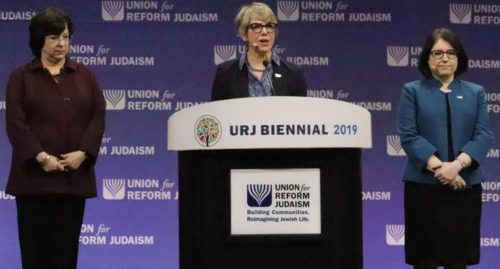Major Jewish Denomination Votes To Support Reparations For Slavery
Share
Explore Our Galleries
Breaking News!
Today's news and culture by Black and other reporters in the Black and mainstream media.
Ways to Support ABHM?
The Union for Reform Judaism is calling for a study on reparations to redress the continuing effects of slavery and systemic racism against Black Americans.
By
The Reform movement, America’s largest Jewish denomination, has passed a resolution supporting the need to make reparations for slavery.
The resolution, approved by delegates to The Union for Reform Judaism’s biennial meeting on Friday, supports the creation of a federal commission to develop proposals to address the continuing effects of slavery and systemic discrimination against Black Americans.
The resolution recounts the history of slavery in the U.S. and points out how racial inequity still affects Black Americans today in areas such as housing, education, employment, health and justice.

Leaders for the Union for Reform Judaism speak before the passing of a resolution supporting the creation of a federal commission to study and develop proposals for reparations in Chicago on Dec. 13, 2019. PC Union for Reform Judaism
“Such injustices will endure unless proactive steps are taken to acknowledge and eliminate them,” the resolution states.
The resolution doesn’t define what form reparations should take, but notes several possibilities, including “expressions of remorse, education, monetary compensation, and more.” It points to Jewish texts on the “importance of restitution for wrongs committed.”
“The rabbis understood that the victim of a crime was made whole by financial repayment for damages done,” the resolution states. “Maimonides [a renowned Jewish scholar] went one step further, linking the payment of damages to the concept of t’shuvah, noting that repentance must accompany the financial commitment.”
The URJ claims it is the first major Jewish institution to endorse the idea of reparations for the enslavement of Black Americans.
Yolanda Savage-Narva, vice chair of Reform Judaism’s Commission on Social Action, called the resolution a “huge first step” because it brings awareness to the issue of reparations. As a Black Jewish woman, she said the resolution is important to her because it shows that her denomination is acknowledging that “there’s this systemic oppression that has been passed down from generation to generation.”
“Looking at something like reparations for Black people in this country is something that is very important when we’re thinking about healing the racial wounds that have been inflicted on this country for at least 400 years,” Savage-Narva told HuffPost…
Read the full article here.
For more Breaking News click here.
For another article discussing reparations click here.









Comments Are Welcome
Note: We moderate submissions in order to create a space for meaningful dialogue, a space where museum visitors – adults and youth –– can exchange informed, thoughtful, and relevant comments that add value to our exhibits.
Racial slurs, personal attacks, obscenity, profanity, and SHOUTING do not meet the above standard. Such comments are posted in the exhibit Hateful Speech. Commercial promotions, impersonations, and incoherent comments likewise fail to meet our goals, so will not be posted. Submissions longer than 120 words will be shortened.
See our full Comments Policy here.